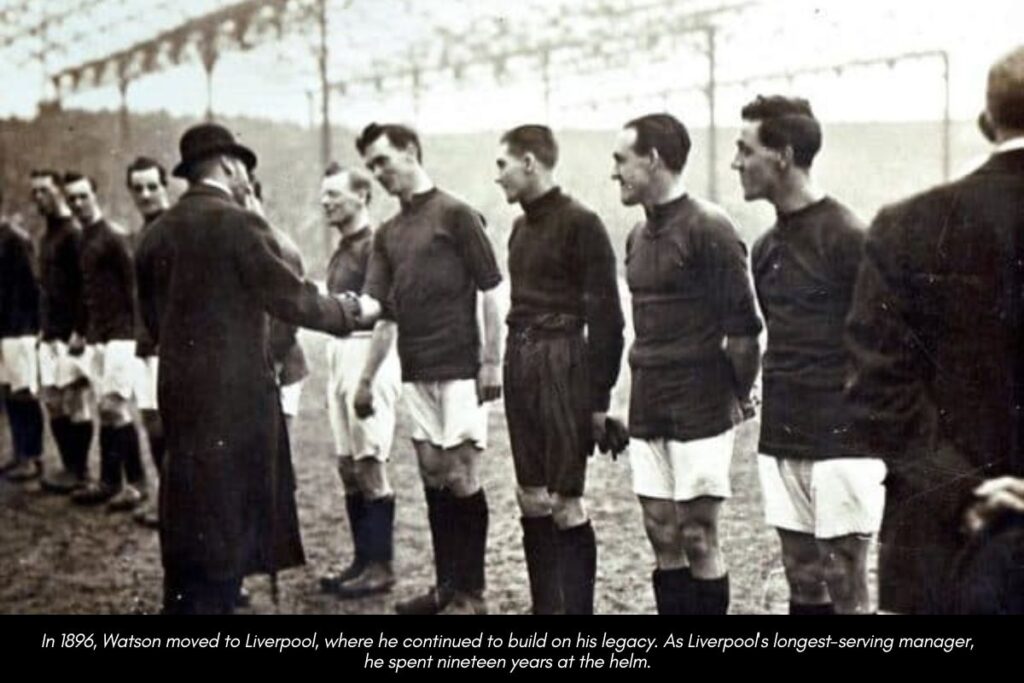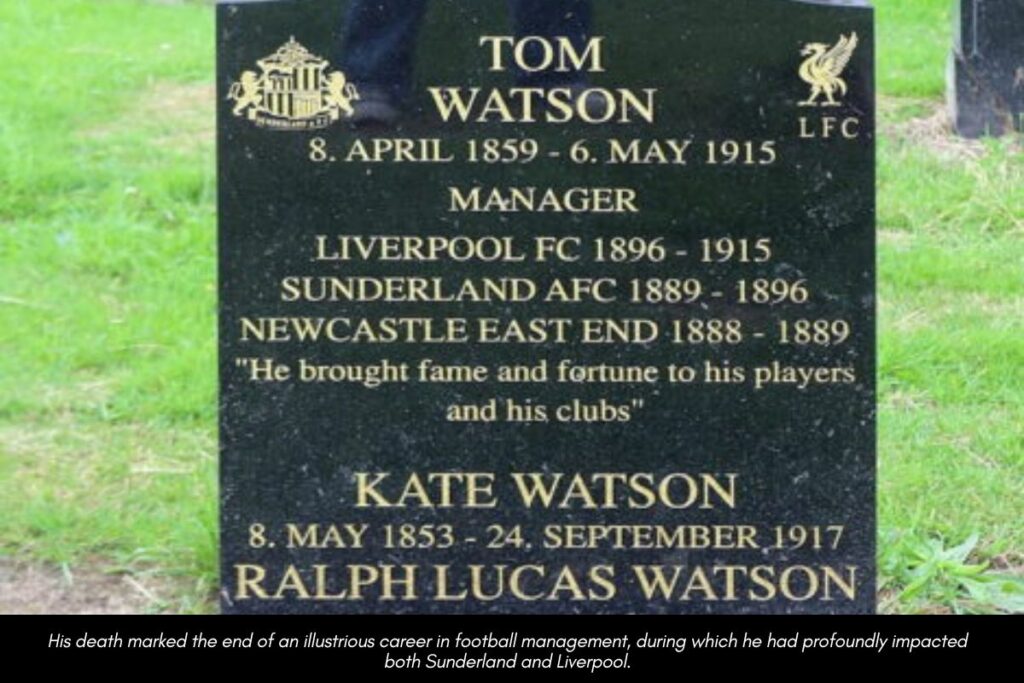Tom Watson, born in April 1859, was a pioneering English football manager whose influence spanned the turn of the 20th century. Watson made a significant mark on English football by becoming the first manager to win league titles with two different clubs: Sunderland and Liverpool. His exceptional ability to lead and inspire teams led to Sunderland’s first league title, firmly establishing the club as a competitive force. Later, he brought similar success to Liverpool, securing their first league championship and laying the groundwork for the club’s storied history.
Watson’s tenure at Liverpool is particularly noteworthy; he remains the club’s longest-serving manager, dedicating nineteen years to the Merseyside team. During this period, he not only achieved remarkable victories but also helped shape the club’s identity and culture. Watson’s legacy in English football is a testament to his strategic acumen and unwavering commitment to the sport, making him a foundational figure in the histories of both Sunderland and Liverpool.
Early Life and Career
Tom Watson began his journey in football by forming the Newcastle upon Tyne-based club Rosehill in 1881. His involvement in local football was extensive, as he played for several local clubs, including Woodbine, Rosewood, and Heaton. Watson’s passion for the game and his organizational skills soon led him to more prominent roles in the football community.
Before his tenure at Sunderland, Tom Watson was actively involved in a secretarial and managerial capacity at his hometown clubs, Newcastle West End and Newcastle East End. At Newcastle West End, he played a crucial role in securing a lease for St James’ Park, a significant achievement that contributed to the club’s development. However, his time at West End ended abruptly in December 1887 following a tragic incident at a game between Shankhouse and Aston Villa, held at St James’ Park, where a crash occurred.
Undeterred, Watson joined Newcastle East End in time for the 1888–89 season. There, he continued his innovative approach of recruiting Scottish international players, a strategy he had successfully employed at Newcastle West End. This tactic not only strengthened the team but also showcased Tom Watson’s keen eye for talent and his ability to enhance a club’s competitive edge. His early career, marked by these strategic moves and leadership roles, set the foundation for his future successes with Sunderland and Liverpool.
Experience at Sunderland and Liverpool FC
Tom Watson’s managerial career at Sunderland spanned six seasons from 1889 to 1896. During his tenure, he successfully led the club into the Football League, a significant achievement that marked the beginning of an era of success for Sunderland. Under Watson’s astute leadership, Sunderland won three league championships in 1891–92, 1892–93, and 1894–95, making him the most successful manager in the club’s history. His team was famously dubbed the “Team of All Talents” by William McGregor, the founder of the Football League, following a remarkable 7–2 victory against Aston Villa. Watson’s innovative tactics and ability to harness his players’ talents solidified Sunderland’s dominance in English football during the early 1890s.

In 1896, Watson moved to Liverpool, where he continued to build on his legacy. As Liverpool’s longest-serving manager, he spent nineteen years at the helm. Tom Watson’s impact on Liverpool was profound, guiding the club to their first two league titles in 1900–01 and 1905–06. This achievement made him the first manager to win league championships with two different clubs, a feat only matched by Herbert Chapman, Brian Clough, and Sir Kenny Dalglish. Watson also led Liverpool to their first FA Cup Final in 1914, although they were narrowly defeated 1–0 by Burnley.
Achievements and Honours
Tom Watson’s managerial career was marked by numerous significant achievements and honors. At Sunderland, where he managed from 1889 to 1896, Watson led the club to three Football League First Division titles in 1891–92, 1892–93, and 1894–95, solidifying their place as one of the dominant teams of the era. Additionally, Sunderland finished as runners-up in the 1893–94 season, underscoring Watson’s consistent ability to keep the team at the top of English football.
Watson’s success continued at Liverpool, where he managed from 1896 to 1915. Under his leadership, Liverpool won their first Football League First Division titles in 1900–01 and 1905–06. The club also finished as runners-up in 1898–99 and 1909–10. Watson guided Liverpool to victory in the Football League Second Division in 1904–05 and to the FA Cup final in 1913–14, where they finished as runners-up. Additionally, he led Liverpool to win the Sheriff of London Charity Shield in 1906–07. Watson’s honors highlight his exceptional managerial skills and lasting impact on both Sunderland and Liverpool.
His Death
Tom Watson’s life came to a tragic end shortly after celebrating his 56th birthday. In late April 1915, following a visit to Newcastle, Watson contracted a chill that quickly developed into pneumonia.

Despite his robust health and enduring spirit, he succumbed to the illness on May 6, 1915. His death marked the end of an illustrious career in football management, during which he had profoundly impacted both Sunderland and Liverpool. Watson was buried at Anfield Cemetery, with many of the players he had guided and mentored carrying his coffin. Tom Watson’s passing was a significant loss to the football community, but his legacy lives on through his groundbreaking achievements and contributions to the sport.
Conclusion
Tom Watson’s legacy as a pioneering football manager is cemented by his remarkable achievements with both Sunderland and Liverpool. His innovative strategies and leadership led to multiple league titles and established him as a key figure in English football history. Watson’s influence extended beyond the pitch, shaping the futures of two of the country’s most storied clubs. As Liverpool’s longest-serving manager, his contributions laid the foundation for future successes.
Next, we will delve into the story of David Ashworth, another significant figure in Liverpool’s history. Ashworth’s tenure as manager brought its own set of challenges and triumphs, further shaping the club’s destiny. Stay tuned to learn about his impact and legacy at Liverpool FC.
Read all other posts on Tom Watson
Find the Latest News on Player Ratings | Transfers | Prematch | Postmatch
Stay tuned for more updates on Liverpool FC Times and Stories. Your thoughts are always welcome in the comments section. Thank you for your continued support!
YNWA (You’ll Never Walk Alone)!
The Liverpool FC Times Team
LiverpoolFCTimes.com
